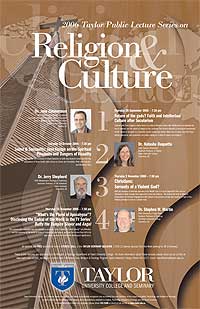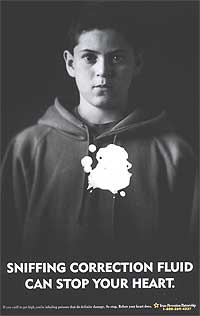The September 2006 edition of LarkNews is online. This issue has a feature about a mega-church that has decided to downsize by kicking out members, among other stories. Read it all for yourself here.
Category Archives: News
The 2006 Arts and Faith Top 100 Spiritually Significant Films
The Arts and Faith Forum has released their annual Top 100 Spiritually Significant Films list. The list contains a whole bevy of interesting films including classics and more popular fare. The films are chosen by members of the Arts and Faith forum through a somewhat convoluted process of voting and as such some films rank higher than they should while other great films get passed over altogether (at least in my opinion).
That being said, here are the top twenty:
- Ordet (The Word)
- Le Fils (The Son)
- The Miracle Maker (The Miracle Maker: The Story of Jesus)
- The Gospel According to Matthew (Il Vangelo Secondo Matteo)
- The Diary of a Country Priest (Le Journal D’un Curé De Campagne)
- The Passion of Joan of Arc (La Passion De Jeanne D’arc)
- The Decalogue (Dekalog)
- Babette’s Feast (Babettes Gæstebud)
- A Man Escaped (Un condamné à mort s’est échappé ou Le vent souffle où il veut)
- Andrei Rublev (Andrey Rublyov)
- Balthazar (Au Hasard Balthazar)
- The Seventh Seal (Det Sjunde Inseglet)
- Ikiru (To Live)
- Winter Light (Nattvardsgästerna)
- The Mission
- The Apostle
- Three Colors Trilogy
- Jesus of Nazareth
- Jesus of Montreal (Jésus De Montréal)
- The Flowers of St. Francis (Francesco, giullare di Dio)
There are not too many surprises in the top twenty, though I can’t believe The Miracle Maker made the top twenty, let alone number three! I was glad to see Magnolia, one of my personal favourites, make number 23.
I was also happy to see that three of the films in Taylor’s fledgling Faith & Film club made the list (Millions #42; Babette’s Feast #8; and Hotel Rwanda #65).
There is much more I would like to comment on, but I do not have time right now. So you’re just going to have to go view the entire list for yourself: Top 100 Spiritually Significant Films. For my brief comments on last year’s list, see here. In addition you may be interested in looking at my “Essential Films for Theologians: The ‘Director’s Cut’â€? or my “Essential Films of 2005 for Theologians – Extended Edition.”
Pop Culture Tidbits: Hobbit in ’07, Star Trek is 40
So, a leak from an insider suggests that New Line Cinema is working on a prequel to The Lord of the Rings: The Hobbit. That would be awesome in my books! Read the speculation here.
Next week (8 September 2006) will be the 40th anniversary of Star Trek. Live long and prosper!
2006 Taylor Public Lectures on Religion & Culture
 One of my responsibilities as Chair of the Religion & Theology Department at Taylor is to organize our annual fall lecture series. This lecture series touches on on some facet of the intersection of religion and culture. This fall we have an exciting line-up of speakers and topics.
One of my responsibilities as Chair of the Religion & Theology Department at Taylor is to organize our annual fall lecture series. This lecture series touches on on some facet of the intersection of religion and culture. This fall we have an exciting line-up of speakers and topics.
Dr. Jens Zimmerman, Associate Professor of English and Canada Research Chair in Religion, Culture, and Interpretation at Trinity Western University will be presenting on the “return of the gods� to contemporary culture and what that means for Christians. After emigrating to Canada from Germany in 1989, Dr. Zimmermann obtained his Ph.D. in Comparative Literature at the University of British Columbia. He has been a professor at Trinity Western University since 1998. His most recent publications are Recovering Theological Hermeneutics: An Incarnational-Trinitarian Approach to Interpretation (Baker Academic, 2004) and The Passionate Intellect: Incarnational Humanism and the Future of University Education (Baker Academic, 2006).
In addition, we have lectures by two Taylor professors. Dr. Natasha Duquette will be lecturing on the novels of Jane Austen as well as their film adaptations, while Dr. Jerry Shepherd will be addressing the controversial topic of violence and the Christianity — especially in light of the biblical portrayal of God as a violent deity. The series will be brought to close with another guest lecturer: Dr. Stephen W. Martin, Assistant Professor of Theology at the King’s University College in Edmonton, will be presenting on theology in the popular culture phenomenon of Joss Whedon’s television series Buffy the Vampire Slayer and Angel. Each lecture will include time for discussion and interaction. Consistent with the aims of our institution, we will explore these topics from a distinctively Christian perspective. In support of this event, we would greatly appreciate if you could promote these lectures.
The four lectures for this fall are:
Lecture 1: “Return of the gods? Faith and Intellectual Culture after Secularism� by Dr. Jens Zimmerman, Associate Professor of English and Canada Research Chair in Religion, Culture, and Interpretation, Trinity Western University, B.C. (Thursday, September 28, 7:30-9:00 pm).
Cultural critic Terry Eagleton claims there is a crisis in Western culture. Global pressures are forcing the West to think deeply about its past and future at a time when our cultural habits have deprived us of the ability to do so. Christian and secular thinkers alike are now prepared to denounce cultural relativism in search of a common humanity. Intellectuals are now proclaiming the end of atheism, indeed even of the secular university and are discussing the return of religion to the academy. This lecture describes and attempts a theological assessment of this “return of the gods” to a formerly secular intellectual culture. What does it mean for our culture and its institutions when the Pope, atheist statesmen, and academics are jointly calling for a return to values and religion?
Lecture 2: “Sense and Sensuality: Jane Austen on the Spiritual Pleasures and Dangers of Visuality� by Dr. Natasha Duquette, Assistant Professor of English, Taylor University College, Edmonton (Thursday, October 19, 7:30-9:00 pm)
This lecture will consider the treatment of visual dynamics both in Jane Austen’s novels and in the film adaptations of those novels, with a focus on Sense and Sensibility, Pride and Prejudice, and Mansfield Park. Representing her heroines as landscape connoisseurs, Austen satirizes the wildly dangerous sublime, sympathizes with the rudely cultivated picturesque, and finally conceives of her own spiritually contemplative sublime. After considering this progression through Austen’s texts, we will critically examine our own complicity in the pleasures and dangers of landscape aesthetics as we view Austen’s spectator characters on film.
Lecture 3: “Christians: Servants of a Violent God?� by Dr. Jerry Shepherd, Associate Professor of Old Testament, Taylor Seminary, Edmonton (Thursday, November 2, 7:30-9:00 pm)
With the increase in terrorism and war in the Middle East, it is more important than ever for Christians to think through their approach to war and violence. This lecture will look at different perspectives on Christian engagement with culture in discussions on war and violence, in light of the biblical portrayal of God as a violent deity.
Lecture 4: “‘What’s the Plural of Apocalypse’? Disclosing the End(s) of the World in the TV Series’ Buffy the Vampire Slayer and Angel� by Dr. Stephen W. Martin, Assistant Professor of Theology, The King’s University College, Edmonton (Thursday, November 16, 7:30-9:00 pm)
N.T. Wright has identified apocalyptic “as a way of investing space-time reality with its full, that is, its theological, significance.� Rather than denying the world, this reading suggests that apocalyptic affirms the world by saying “no� to the finality of evil. This lecture will investigate how two television programs, each created by “rabid atheist� Joss Whedon, see the meaning of the world in terms of impending apocalypse, and how the stories they tell in its light serve to invest the world with theological significance.
All lectures are FREE and will be held in Stencel Hall, in the Taylor Seminary Building, 11525-23 Avenue (access from the West parking lot off 23 Avenue).
I will be posting MP3s of the lectures on the Lecture website (which will be here eventually). I may even video record the lectures and post them on YouTube. For past lectures (including free downloadable MP3s), please go to the Public Lecture Archive page.
School Supply Silliness? – White Out Banned!
 My kids all go back to school next week, so naturally we have been getting together their school supplies for the year. Most of the items are standard: duotangs, paper, pens, pencils (HB pencils of course!), etc. What caught my eye, however, was a note on one of my kid’s supply list that White Out (aka Liquid Paper, white correction fluid, etc.) wasn’t permitted “for safety reasons.” This was the first time for this sort of notice.
My kids all go back to school next week, so naturally we have been getting together their school supplies for the year. Most of the items are standard: duotangs, paper, pens, pencils (HB pencils of course!), etc. What caught my eye, however, was a note on one of my kid’s supply list that White Out (aka Liquid Paper, white correction fluid, etc.) wasn’t permitted “for safety reasons.” This was the first time for this sort of notice.
My first thought was “Huh?! Why in the world are they banning White Out?!” I considered this to be another example of elementary schools going nuts with silly rules. But why White Out? Did the caretakers finally get sick and tired of cleaning it out of the carpet? Were teachers scared that students would hurl the little white bottles at each other?
As it turns out, I guess in some schools sniffing correction fluid has been an issue. In the 1980s a kid even died from sniffing the stuff. The state of Texas even had an ad campaign highlighting the dangers of sniffing correction fluid:
So there you go… I guess I have been corrected! File this in the “things I didn’t realize” folder. Of course, since the 1980s the manufacturers of correction fluid have changed their formulas so that it isn’t as much of an issue any more. You can even get water-based correction fluid that won’t even give you a buzz.

